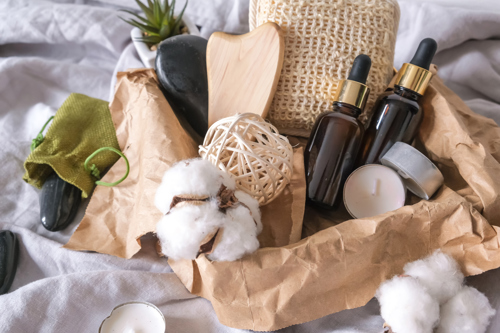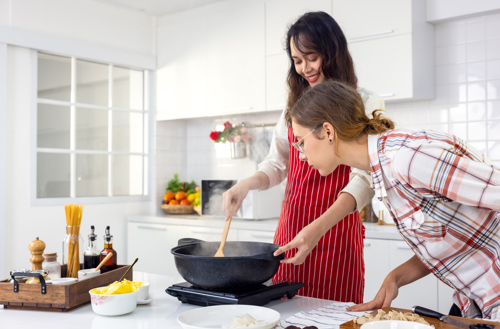Learning that your friend or loved one has breast cancer can be shocking, and you may be wondering what you can do to help. While there’s no easy, one-size-fits-all approach to supporting someone with breast cancer, we’ll share some of the thoughtful gestures that you can use to show them you care.
1. Learn to Listen
You might be at a loss for words after getting the news about your friend’s breast cancer diagnosis. But even if you feel devastated, it’s important to center the conversation around them and their needs. This is an emotional time for them, and not all gestures or responses are comforting, despite your best intentions. If you’re struggling to know what to do or say, take a step back: let your friend lead the conversation, and feel free to chime in with validation, encouragement and simple expressions of concern. You don’t have to offer sage wisdom or grandiose promises — it’s often best to be honest and heartfelt. Some great things to say include:
- “Do you want to talk about it?”
- “You’re strong. You can do this.”
- “We’ll get through this together. You’re not facing this alone.”
- “I’m here for you.”
- “I don’t know what it’s like to be in your shoes right now, but I want you to know I am here for you. Please let me know what I can do.”
While it’s good to be positive yourself, don’t tell your friend that they should stay positive, or compare their situation to other friends’ and loved ones’ cancer journeys.
|
Breast cancer statistics in the U.S. (courtesy of the Breast Cancer Research Foundation):
|
2. Be an Advocate and Companion
It takes a lot of strength for someone diagnosed with breast cancer to think about how they — and their family — will get through it. Sometimes, the best way you can show up for them is to be an advocate and companion. Whether it’s driving your friend to their doctor’s appointments (and helping them take notes and ask questions, if they agree to it), spending the night in the hospital room with them after their surgery or making sure that they have everything they need to be on bedrest at home, simply being with them can make their cancer treatment and recovery a lot less lonely, as well as allow them to focus on their well-being. Again, let your friend lead the way and make sure you’re respecting their privacy every step of the way — they may need support one day and space the next.

3. Make a Care Package
Chemotherapy can be hard on your loved one’s body and significantly change their daily routine. Creating a chemo care package can be a thoughtful way to show them you care, while also providing them with tangible, useful items that can help them feel more comfortable during the treatment process. Include items that can directly address some of the common side effects of radiation, which include dry, itchy skin; chapped lips; dry mouth; and nausea, among others. Some recommended items include:
- Lotions and bath products (including moisturizing face masks)
- Lip balms
- Compression socks
- Ginger chews
- Anti-nausea bands
- Coloring books, puzzles and crosswords (to pass the time)
4. Connect Them With Survivors
While comparing your friend or loved one’s situation with other breast cancer patients or survivors you know is hardly tactful (after all, no two cancers are ever the same), it can be helpful to put them directly in touch with a survivor who knows exactly what they’re going through. Be sure to ask them if they’d like to be connected in the first place, then give them the survivor’s phone number so they can follow up on their own time. Alternatively, you can point your friend or loved one to the American Cancer Society Reach to Recovery program, which will pair them with a volunteer who’s experienced a similar type of breast cancer, stage and treatment.
5. Cook Dinner Together
Sometimes, your friend may simply want company, and cooking dinner together (if they’re feeling well enough) can be a great way to spend an afternoon or evening. Let your friend tell you when they’re free, and be flexible in case they have to cancel at the last minute. Ask them what they’d like to eat that day, and grab fresh ingredients to bring to their home. Remember that people who’ve recently undergone chemotherapy may have experienced changes in their palette and eating habits. Here are some general tips to keep in mind:
- Make smaller portions (and serve on smaller plates). Feel free to refrigerate or freeze the leftovers for your friend.
- Keep the kitchen well ventilated, and consider serving the meal outdoors (weather permitting) or in a separate room. Let food cool to room temperature before serving to avoid strong aromas that may trigger queasiness in your friend.
- Be adaptable. If your friend suddenly isn’t feeling well and can’t stomach your meal, stay patient. Be sure to offer liquids for hydration and check on them to see how you can support them.
- Let them help with light tasks in the kitchen, if they feel strong enough.
6. Run Errands or Deliver Meals
Your loved one may need to stay at home and rest for weeks or months after treatment, so stepping up and offering to run errands for them — such as buying and delivering groceries — or even dropping off homemade meals or takeout from their favorite restaurant can be a profoundly meaningful gesture. Be sure to pay attention to the details, especially during a time when routine and familiarity are even more important. Write down exactly what types of groceries and toiletries (and brands) they enjoy, and share with everyone who might be shopping for them. When delivering meals, feel free to whip up a dish if you know they’ve had it before and liked it, or else opt for buying and picking up a meal from their restaurant of choice. (Taste buds often change during pregnancy, and unfamiliar foods and beverages may not taste pleasant.)

7. Support Research Initiatives
Sometimes, showing up for your friends and loved ones with breast cancer means supporting the community as a whole. Look out for fundraising walks or marathons around the U.S., such as Making Strides Against Breast Cancer, hosted by the American Cancer Society. (You can see which participating cities by entering your zip code here.) You can also donate to organizations such as Breast Cancer Research Foundation, which has been involved in breast cancer research breakthroughs for the last 25 years and currently supports 275 researchers across 15 countries and 5 continents.
8. Continue to Check on Them After Recovery
Breast cancer is a long road — the timeline from diagnosis to treatment can last more than a year. And even though many people may rush in to help at the beginning, some will check in less and less frequently over the course of a patient’s recovery. Even after your friend or loved one has fully recovered (a process which may take 6 to 8 weeks), be sure to send them texts or call them to see how they’re doing and whether or not they need any additional support. After all, the transition from treatment to “normal” life can be jarring, and your check in may be the thing they need to help them get back on their feet.
Breast cancer learning center (courtesy of the National Breast Cancer Foundation):



